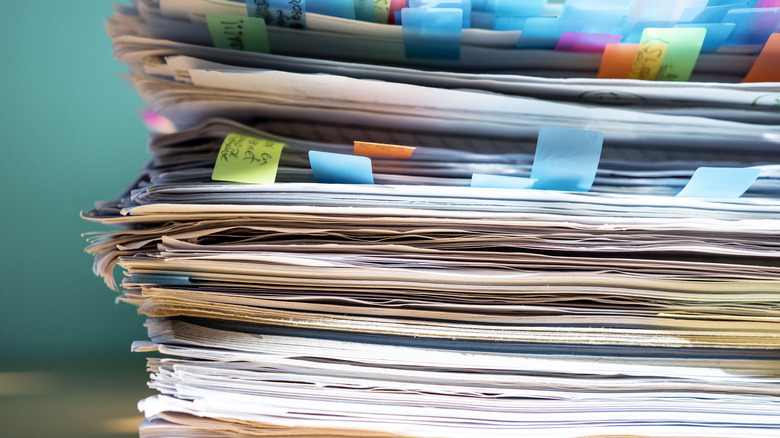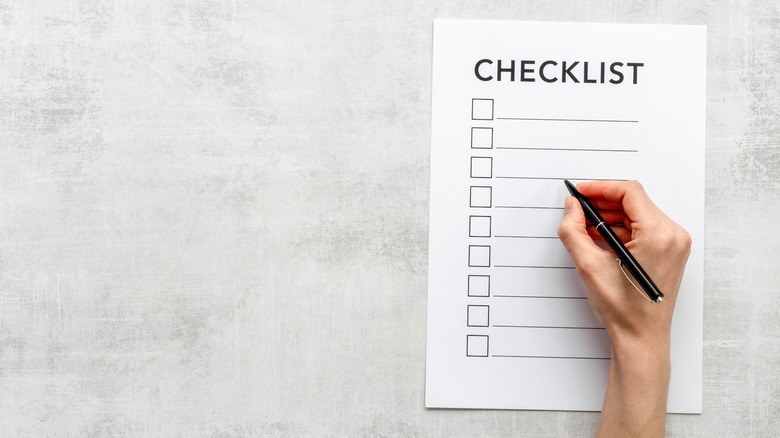These Are The Documents You'll Need When Buying A Used Motorcycle
Whether you're buying a motorcycle new or used, it's unfortunately never quite as simple as walking into a grocery store and walking out with a box of cereal. You might assume that the solution to this is to buy a used motorcycle directly from a private seller, but while you could leave all the red tape out in such a circumstance, it would only be to your detriment. After all, the entire purpose of paperwork and questions when you buy a vehicle at a dealership is to ensure they can't rip you off.
If you're buying from a private seller, it's on you to do all of the usual paperwork production on your own. This means, when you go to meet the seller, you have all of the vital documentation packed up and ready to go to facilitate a smooth, fair transaction. This vital documentation includes simple elements like a proof of identity and financial information, as well as more specialized articles like proof of insurance, a bill of sale, and a formal title transfer. While you're in the midst of a storm of paperwork, it would also be to your benefit to prepare a checklist of inspection points, just so you can quickly gather information about the motorcycle before money changes hands.
Bring proof of identity and insurance, a bill of sale, and financial documentation
Proper documentation ensures both safety and fairness for both sides of a transaction. If you show up to a seller's property with empty hands, they justifiably won't feel safe doing business with you. If they do still try to proceed even without documentation, that's a red flag for you.
The first and simplest thing you'll need is proof of identity. A driver's license will work fine, just a little something to prove you are the buyer the seller has been talking to, as well as your legal eligibility to buy and own a vehicle.
Next, bills and titles. You should have a pre-filled bill of sale ready for action for both you and the seller to fill out. This document should have all of the motorcycle's details, the date and price it's being sold, and both you and the seller's legal signatures. Don't forget to have the seller sign the title to the motorcycle over to you so you can submit it to your local DMV and assume formal ownership over it. It's one of the first things you should do after buying a used bike.
Finally, money matters. It's a legal requirement to have insurance for any vehicle you own, so make sure you've got a policy ready to kick in as soon as the bike is yours. Additionally, if you're purchasing the vehicle via financing or a loan, make sure you've got proof that you were approved. This is doubly true if you're paying with any method besides cash, as it'll assure the seller your check won't bounce.
A checklist of inspection questions and topics isn't required, but definitely helps
There's one particular piece of documentation you should bring with you to a used motorcycle purchase that the seller doesn't need to see: a checklist of inspection points. There may be an assumption that you're going to make a purchase if you're visiting the seller in person, but this is also a vital opportunity for you to check out the bike before money changes hands. You might just stumble onto something that makes the purchase a lot less appealing.
Write your checklist on an actual piece of paper, instead of storing it on your phone, just so you don't have to stand there fiddling with apps to find it. As for what should be on it, you should include any information that the seller either didn't have in the original listing or that you aren't sure about. This can include physical concerns like the current state of the tires, the efficiency of the brakes, and the condition of electronics like headlights, as well as details on the bike's history like the last time it was ridden, its overall mileage, and whether it's ever been involved in a crash. Don't be afraid to get in-depth; it's your right as a buyer to ask for whatever information you see fit before you hand over the cash.


